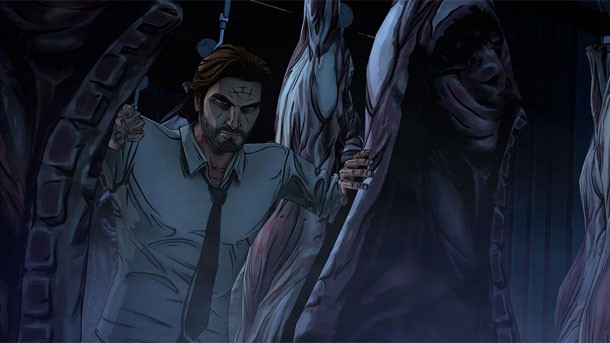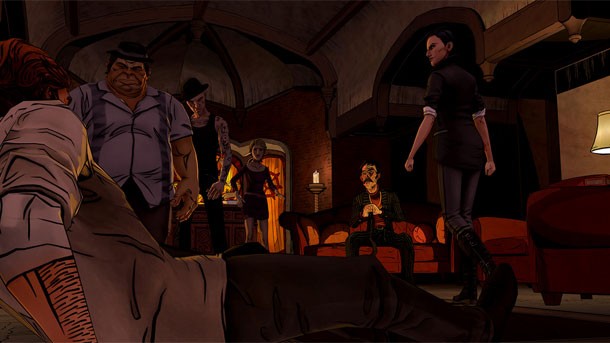Our extra-large special edition is here. Subscribe today and receive the 25% longer issue at no extra cost!
The Wolf Among Us From The Outside – Part IV

Telltale recently released the fifth and final episode for The Wolf Among Us. This weekend, as part of a continued experiment, I sat down with my wife and watched as she played through it. We’ve done so with previous installments (you can read the results here, here, and here), and I was looking forward to seeing how both the game and our shared experience would end.
Spoiler Warning: I’ll be discussing the plot and other game details in this post
The fourth episode came out during a busy time in our household, landing between various work trips, family visits, and other activities. For the first time, we rolled from one episode directly into the next. My big question was simple: Had she been wondering about what Bigby and the rest of the fables were up to? As it turns out, the answer was a big, fat nope.
“I gave it no thought, to be honest,” she says. Ultimately, it seems like Telltale’s episodic format, which is one of the things that sets its games apart, made it tough for her to remain invested in The Wolf Among Us. Take her interaction with Colin the pig, for example. “Things are spread out, and he didn't make a big impact on me from earlier on in the game,” she says. “All of a sudden you're making decisions on whether to send him to the farm, and you're like, 'I don't really care about this guy, I barely remember him.'”
The simple gameplay didn’t help to engage her, either. She skillfully guided Bigby through each quick-time event, leaving a bloody wake of chaos behind her. The veneer of choice and success didn’t fool her, however. Take an early moment in season four, for example. A doctor removes bullets from Bigby following a battle with Bloody Mary. All the while, he squirms from the pain of a compound arm fracture. She chose to fix it, whereupon she faced yet another QTE. This time she messed up, but the doctor immediately took over, repairing the limb.
“It's a little weird when you're supposed to do something and you don't do it, and it does it anyway,” she says. “What's the point of moving anything? Obviously, there are things you had to do in order to survive, but they weren't terribly difficult. Certainly, the point of the game wasn't to have you struggle through those.”

Episode five features the climactic battle between Bigby and Bloody Mary, where they battle in an abandoned foundry. She attacks him with a flurry of clones, and he transforms to his ordinary anthropomorphized wolf form in response. Even that leaves him overwhelmed – which leads him to go into full-on Big Bad Wolf mode. I saw it coming, and I braced myself for a snicker that didn’t come. “You said, 'He's going to huff and puff,' and I thought, 'That's super cheesy!'” she says. “And then he huffed and puffed, and it wasn't as cheesy as I was expecting, because it wasn't what I imagine when I think of huffing and puffing. He was just blowing out a bunch of stuff.” Whew!
When she finally confronted The Crooked Man, the architect of the sinister goings-on in Fabletown, she decided to ultimately kill him instead of turning him in alive to Snow for justice. That came as a surprise to me. As always, there was a method to her apparent madness. “Here was my thought process: He told you everything, and there was nothing he could say,” she says. “I guarantee on the other side of that story, if I'd chosen the other option, that there wouldn't have been any answers. I did feel weird doing it, but as a character I wanted to Jack Bauer my way out of it and throw someone through a window.”
Now that we’re done, I asked her what she thinks of Telltale’s story-heavy focus. As cool as she was on the series overall (she compared it unfavorably to Heroes, to put it in perspective), she sees the potential to the concept. “I think it's enjoyable to be able to create the characters that you want, it's enjoyable to figure out how that character would respond to different situations,” she says. “I think the story itself fit the character, but I don't think it was that entertaining. Again, with the spaced-out episodes, it's not that engaging to begin with, so to have these big breaks where you're not playing it [doesn't help].”
While we were playing, she kept referring to “her Bigby,” and her own interpretation of the character – which was reinforced through her decisions. I was surprised to see how ultimately disengaged she was from him, even after spending all those hours with him and taking those choices so seriously. “I don't know that I stopped caring about the game, I just don't know that I got invested enough to care greatly. If he died at the end, I would have been like, 'Welp, he gave himself up for the greater good. Ehh.'”
There’s still hope, however. She remains keen on the idea of playing The Walking Dead, and I know that it’ll be a better fit overall. Now that we’re done with this world, it’s time to move onto something more familiar.
“I care about zombies, I don't care about fables,” she says.

Get the Game Informer Print Edition!
Explore your favorite games in premium print format, delivered to your door.
- 10 issues per year
- Only $4.80 per issue
- Full digital magazine archive access
- Since 1991








